Share

Give First
Techstars Director of ESG on Being a Responsible Founder and Investor
When a thoughtful founder or investor is thinking about creating or sustaining long-term value and a company that adapts for the future, they are already inherently thinking about environmental, social, and governance issues (ESG).
ESG is for ALL companies - not just the ones focused on the environment.
Dr. Mairi-Jane Fox, Director of ESG at Techstars, breaks down the creation of ESG, starting from when companies began to think about their corporate social responsibility (CSR), to the sustainability movement across corporates, and now tracking how companies were addressing ESG issues.
“ESG evolved out of those spaces when investors, who are a powerful crew for change, started to realize companies could lose their social license to operate by making poor social choices,” Mairi-Jane says. “ESG is the data-driven thinking about financially material stuff that investors know impacts a company … so that they can manage for those risks or even manage for a positive impact.”
Listen as Mairi-Jane and David discuss different examples of ESG responses and how ESG can set up companies for greater success. Also, don’t miss how Techstars is modeling ESG operational standards for its portfolio companies.
If you missed the previous ESG takeover episodes, check out episode #66 on the benefits of ESG measurement for your company; episode #68 on how to engage with investors; and episode #69 on what it means to be a b corp.
Follow David Cohen on Twitter @davidcohen
Listen & subscribe to the Give First podcast on Apple Podcasts, Spotify, and more.
More episodes
View all episodes
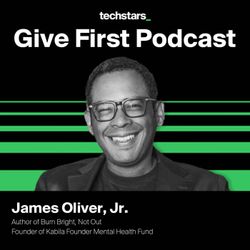
108. Burn Bright, Not Out: James Oliver Jr. on Founder Mental Wellness
24:12||Ep. 108In this episode of the Give First podcast, David Cohen sits down with James Oliver Jr., Techstars alum, entrepreneur, and author of Burn Bright, Not Out.James shares his journey navigating the pressures of high achievement and the hidden cost of hustle culture. He introduces the Burn Bright Spectrum, a framework to help founders recognize the difference between healthy ambition and burnout, and explains why rest, micro-wins, and alignment are essential to long term success.The conversation explores founder mental health, breaking stigma in the startup community, and how sustainable performance drives deeper impact than constant grind.Follow James Oliver Jr. on LinkedIn ➡️ https://www.linkedin.com/in/james-oliver-jr/ Order Burn Bright, Not Out ➡️ https://www.amazon.com/Burn-Bright-Not-Out-ShatteringThe-ebook/dp/B0GG8FCCQZCheck out the Kabila Founder Mental Health Fund ➡️ https://give.socialgoodfund.org/KabilaMentalHealth?ref=ab_7QGjqr7P0pr7QGjqr7P0pr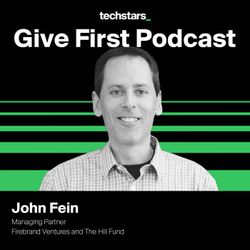
107. Finding Your Way Back to What You Love Through Give First with John Fein
23:16||Ep. 107In this episode of the Give First podcast, David Cohen sits down with John Fein, partner at Firebrand Ventures and former Techstars managing director.John reflects on the winding path of his career, from moments of uncertainty to finding renewed purpose through startups, venture, and community building. He shares how small acts of generosity, like answering a random email or making an introduction, can create lasting impact and open entirely new chapters.The conversation explores John’s journey through Techstars, the evolution of Firebrand Ventures and The Hill Fund, and his long term commitment to the Kansas City startup ecosystem. Along the way, David and John discuss imposter syndrome, paying generosity forward, and why Give First is less a philosophy and more a practice that compounds over time.John Fein LinkedIn ➡️ https://www.linkedin.com/in/johnfein/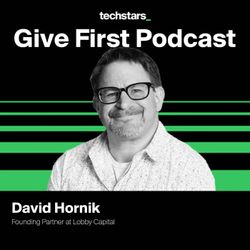
106. The Long Game of Venture and Generosity with David Hornik
28:51||Ep. 106In this episode of the Give First podcast, Brad Feld talks with David Hornik, founding partner at Lobby Capital.David shares how a relationship driven approach has shaped his career in venture capital, from investing to community building. He reflects on why generosity compounds over time, how trust creates durable networks, and why long term thinking matters in both business and life.The conversation also touches on the origins of the Lobby conference, David’s connection to Adam Grant’s Give and Take, and how the Give First mindset shows up in his work with founders, students, and investors.David Hornik LinkedIn ➡️ https://www.linkedin.com/in/davidhornik/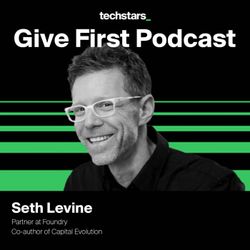
105. Rethinking Capitalism with Seth Levine
25:51||Ep. 105In this episode of the Give First podcast, David Cohen talks with Seth Levine, Partner at Foundry and co-author of Capital Evolution. Seth looks back on the early days of Techstars, the original Boulder community that shaped it, and how Foundry is approaching its final fund while still actively investing.The conversation explores why so many people are questioning capitalism today. Seth breaks down the decline in economic mobility, the growing wealth gap, and the rise of populism on both sides of the political map. He explains why he believes capitalism can still work, but only if more people have access to ownership and economic participation.Seth also shares insights from interviews featured in his book and highlights ideas like broader employee ownership, baby bonds, and modernized investing rules. He ties these themes back to the Give First mindset and how expanding opportunity can strengthen communities and the future of entrepreneurship.Seth Levine LinkedIn ➡️ https://www.linkedin.com/in/sethjlevine/ Get Capital Evolution here 📖 https://www.amazon.com/Capital-Evolution-New-American-Economy/dp/1637747780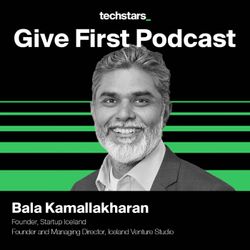
104. Starting and Closing a Bank in 3 Months with Bala Kamallakharan
49:08||Ep. 104In this episode of the Give First podcast, Brad Feld talks with Bala Kamallakharan, founder of Startup Iceland and a driving force behind the country’s modern startup ecosystem. Bala shares the remarkable story of moving to Mumbai to build an Icelandic bank in 2008, only to watch the entire financial system collapse overnight. Within three months, he went from launching a new bank to shutting it down, navigating canceled credit cards, emergency flights home, and the emotional aftermath of Iceland’s economic freefall.What followed was a personal reset. Returning to Iceland with no clear path forward, Bala began to rethink how the country could rebuild. His belief that new ideas and young founders could reshape the future led him to invest in early startups, create Startup Iceland, and champion the power of community-driven entrepreneurship. That work later earned him the Order of the Falcon, Iceland’s highest civilian honor.Bala reflects on uncertainty, resilience, and why believing in founders can transform not only companies but entire countries.Bala Kamallakharan LinkedIn ➡️ https://www.linkedin.com/in/balakamallakharan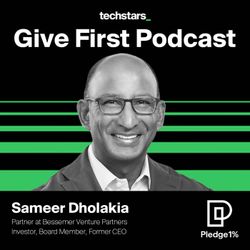
103. How Pledge 1% Sparked a Global Movement for Startup Philanthropy
22:35||Ep. 103In this special episode of the Give First podcast, Brad Feld and Sameer Dholakia revisit the origins of Pledge 1%, the global movement helping startups build philanthropy into their business from the start.What began as a simple conversation in Boulder between Brad and Rally Software co-founder Ryan Martens grew into a worldwide initiative championed by Salesforce, Atlassian, Techstars, and thousands of founders who have pledged 1% of equity, time, or product to social impact.Brad and Sameer trace how a local idea became a global force for good, fueling billions in new philanthropy and inspiring the next generation of founders to make giving part of their growth story.Sameer Dholakia ➡️ https://www.linkedin.com/in/sameerdholakia/ Pledge 1% ➡️ https://www.pledge1percent.org/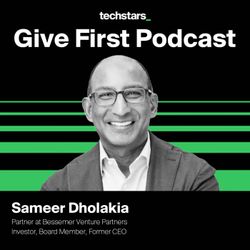
102. How Sameer Dholakia Led SendGrid to IPO and Exit
38:08||Ep. 102In this episode of the Give First podcast, Brad Feld sits down with Sameer Dholakia, partner at Bessemer Venture Partners and former CEO of SendGrid, the first Techstars company to go public.When Sameer joined SendGrid, growth was slowing and the company was losing money. Under his leadership, it became a $250M business, went public, and was later acquired by Twilio.Sameer shares the story of how his mother’s advice shaped his approach to leadership and why empathy and clarity became his greatest tools as a CEO. From his first days stepping into a nervous team, to navigating “oh sh*t” moments on the path to IPO, Sameer reflects on the lessons that defined his career, and how they continue to guide his work with founders today.Sameer Dholakia ➡️ LinkedIn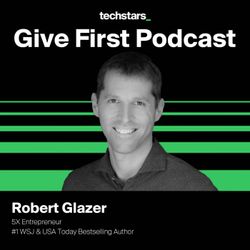
101. The Compass Within: Robert Glazer on Leading with Core Values
29:00||Ep. 101In this episode of the Give First podcast, Brad Feld sits down with Robert Glazer, 5x entrepreneur, #1 Wall Street Journal and USA Today bestselling author, and author of the new book The Compass Within.Robert shares his framework for uncovering personal core values, the principles that guide decisions, relationships, and leadership. The conversation explores why many people are climbing the wrong mountains, how self-awareness shapes growth, and why aligning words with actions may be the most important skill any founder or leader can develop.Find out more about Robert Glazer here ➡️ robertglazer.comFollow Robert Glazer on LinkedIn ➡️ linkedin.com/in/glazerThe Compass Within is out today, order your copy here ➡️ robertglazer.com/compassCheck out the Six Core Values Questions page ➡️ robertglazer.com/six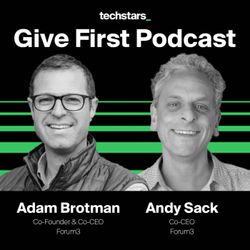
100. AI First Leaders | Andy Sack & Adam Brotman on Scaling with the AI Wave
24:36||Ep. 100In this episode of the Give First podcast, David Cohen sits down with longtime Techstars friend Andy Sack and former Starbucks Chief Digital Officer Adam Brotman, co-CEOs of Forum3 and co-authors of AI First: The Playbook for a Future-Proof Business and Brand.They explore why AI isn’t just another vertical, but the foundation of how companies will be built, operated, and scaled in the years ahead. Andy and Adam share insights from their work on what it means to be an “AI-native” founder, why iteration and prompting are becoming core entrepreneurial skills, and how disruption could lead to billion-dollar companies run by just a handful of people.The conversation covers practical takeaways for entrepreneurs, lessons from their entrepreneurial journeys, and why adopting an AI-first mindset may be the difference between thriving and being left behind in the next wave of innovation.Get Andy and Adam’s book ➡️ https://www.amazon.com/dp/B0D8TZDR74?ref=KC_GS_GB_US Follow Andy Sack on LinkedIn ➡️ https://www.linkedin.com/in/andysack/ Follow Adam Brotman on LinkedIn ➡️ https://www.linkedin.com/in/adambrotman/